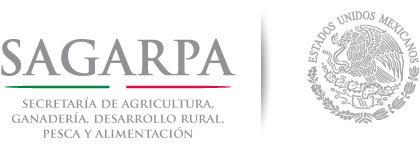
Mexico City, May 21, 2014
• During a bilateral meeting, the head of SAGARPA, Enrique Martinez y Martinez, and the Minister of Agriculture and Agri-Food Canada, Gerry Ritz, agreed upon concrete actions to enable the exchange of agri-food products that at certain times, due to climate or seasonal issues, are scarce in the other country; the aim is to streamline the supply of agri-food products for the benefit of both nations.
• They also agreed to advance the creation of a Binational Project to facilitate capitalizing on complementarities between Mexico and Canada in the areas of productive processes and best practices, with the application of research and development to improve food production.
• Minister Ritz emphasized that to match the power that Asia has achieved in food production, the countries of North America must work together as a bloc.

During a bilateral meeting held today, Mexico and Canada agreed to take concrete actions to exploit the great potential in production complementarity between the two countries.
These actions will enable the exchange of agri-food products that at certain times, due to weather or seasonal issues, are scarce in the other country; the purpose is to streamline the supply of agri-food products for the benefit of both nations.
These actions will also facilitate the creation of a Binational Project that would make it possible to capitalize on complementarities between Mexico and Canada in the areas of production processes and best practices, with the application of research and development to improve food production.
The Secretary of Agriculture, Livestock, Rural Development, Fisheries and Food, Enrique Martínez y Martínez, and his counterpart in Canada, Gerry Ritz, noted that this type of commitment is essential to meet the food production requirements established by the United Nations Food and Agriculture Organization (FAO) by the year 2050.
They stated that this implies a major challenge and, to meet it, we must learn to work as a region, integrating a program of settlement and training so that producers learn to apply science, technology and mechanization in the field.
In this way, they affirmed, North America can be a more competitive, more productive region.
Minister Ritz stressed that the only way to match the power that Asia has achieved in food production is for Mexico, the United States and Canada to work together as the North American bloc.
He said that in terms of food production there are many challenges, some of which cannot be controlled, like the weather; as such, he said, it is important to work on those things that can be managed, and for that we need to harmonize laws and scientific criteria.
He thanked his Mexican counterpart for the hospitality offered in inviting him to participate in the Fifth Assembly of the National Confederation of Livestock Organizations (CNOG)–inaugurated this past Monday in Zacatecas– an event during which he learned of the Mexican livestock sector’s programs and growing success.
To date Canada has recognized nine Mexican states as being free of Classical Swine Fever. In this regard, Minister Ritz said a task force will be integrated to expedite the recognition of other states, in order to expand the marketing of Mexican pork in Canada.
During the meeting, emphasis was placed on the successful work carried out by the tri-national technical group on pesticides, through which permits are also issued for beneficial products and in regard to Maximum Residue Limits, in accordance with the criteria established by the Codex Alimentarius
The delegations of the two countries agreed to continue working together to defend the decision of the World Trade Organization (WTO) on meat labelling, since measures such as the Law on Country of Origin Labelling (COOL), imposed by the U.S. government, hamper international trade among nations.
The Mexican delegation included Agriculture Undersecretary Jesús Aguilar Padilla; the chief director of the National Service for Food Health, Safety and Quality (SENASICA), Enrique Sánchez Cruz; the Coordinators General of International Affairs, Raúl Urteaga Trani, and Strategic Planning, René Villarreal Arrambide, and the Commissioner of Evidence and Risk Management from the Federal Commission for Protection Against Health Risks (COFEPRIS), Rocío Alatorre Eden-Wynter
On behalf of the Canadian government, participants included the Canadian Ambassador to Mexico, Sara Hradecky; Director of Communications, Jeffrey English; Policy Advisor, Karla Barnes; Agri-food Counsellor of Canada in Mexico, Kim O'Neil; and Technical Advisor from the Canadian Food Inspection Agency (CFIA), Francis Lindsay.